Breaking Prejudices Bravely: The Story of a Girls’ Cricket Team
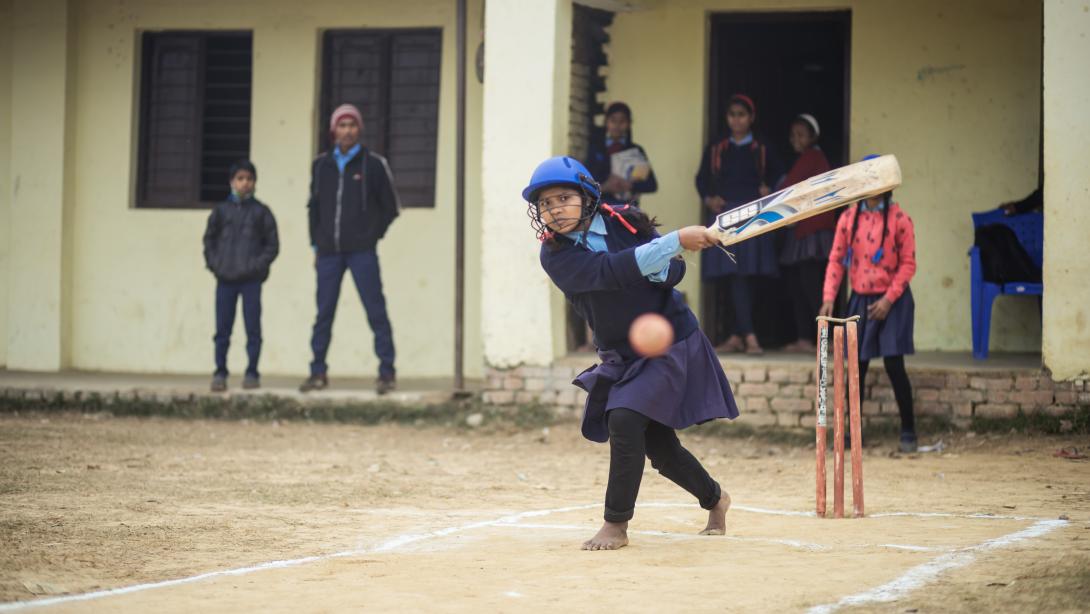
Nichuta, a small hamlet in Parsa district, welcomes anyone with great hospitality. Here, where 30% of the population are Muslims while 70% are Hindus, people live in great harmony. Part of the Terai Region, Nichuta is about 21 kilometers west of Birgunj Metropolitan City and farming is the main occupation. The village is quite rich in infrastructure for transportation, communication, and education, yet despite its many benefits, it is not an ideal world for some residents.
Specifically, the community is a difficult place for girls, who face many challenges as gender-based prejudices are deeply rooted. While girls may have legal rights, they do not have freedom. Girls aren’t allowed to speak loudly, laugh openly, or walk alone in public. They rarely venture outside their home and, tragically for many, early marriage is extremely common. Girls go to school, but neither they, their parents, or their teachers dare to dream about an educated future for them. As soon as they have completed Grade Seven, girls are seen as eligible for marriage and often pulled out of school as a result. This limited role girls have been assigned by society impacts their personalities to a significant extent so that some of them feel like they can’t speak up or participate while they are in the classroom.
At the school where I teach, we have always organized games and sports. While the boys always took part in all the games, girls would only play certain games like badminton, and only within their own circles. When we held a cricket match not long ago, I noticed that only the boys were playing while the girls sat nearby and watched — even though there were extra bats and balls available. I suggested that some of the Grade Nine girls I taught join in but as soon as they picked up a bat the boys started laughing and mocking the way they were holding it. This wasn’t something new and I could see that the girls were already feeling low. So I went towards them and said, “If you leave this bat today, they are going to mock you every single day. If you trust yourself just play. Go for it.” When they started playing I could see how much they enjoyed the game and I realized that cricket could build motivation in our girls.
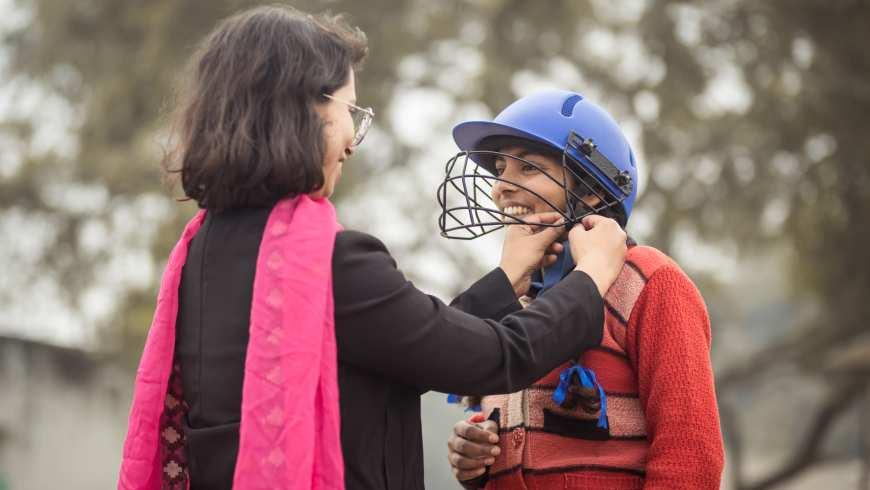
But, getting from that realization to full participation from the girls was not as easy as it might seem. The girls thought that cricket was a game that only physically fit people could play, and to them, physically fit people were boys, not girls. It was difficult for us to change this mindset so we decided instead to address it differently. We told the girls that yes, they were right, cricket is a game for physically fit people, but we could help them become physically fit. My co-fellow worked very hard with the girls not only to build up their fitness and strength but also to help them realize how fit they already were. Every time they trained he reminded them of how hard they worked in the house and the fields, and how that was all a form of exercise.
Slowly and gradually they began walking instead of crawling. Now, it was time for them to run instead of walk. This was another difficult step and we decided to seek help from the boys — the same ones who were always making fun of the girls who tried to play cricket. I went up to them and asked “You can play right?” They said, “Yes, we can play well,” and noted that they had won several matches. I then proposed an idea: “I will consider you as the best player if you can teach these girls to play as you all do. I’m sure it was easy for you to learn, so now try something difficult, try to teach cricket to these girls.”
I didn’t expect the boys to accept this challenge but the next day I found them training the girls and teaching them different cricket tricks and moves. We organized an inter-class girls match shortly afterwards and the boys put in a lot of energy to make it successful by coaching both teams and cheering them on. After the match, I asked the boys how they felt it had gone. The first thing I heard from one student, Ilhan, was “I succeeded in helping them overcome their fears.” Another student, Farhan, said, “They have never talked to me and asked for any other favor, but this time it was different. They came and asked for help and I couldn’t say no.” This was such a great moment for me. The boys’ thought-processes and perspectives were so changed — they were saying that girls shouldn’t stop here, that girls shouldn’t be quiet, and were even asking girls to be loud in the classroom and elsewhere.
Later, I asked the girls whether they wanted to play a match against another school. Kabita, the captain of the team, immediately said yes, and we set up a match with the school from the next rural municipality. Once again the boys were actively involved with all of the arrangements, from coaching the girls to raise their confidence, to teaching them the rules and technicalities, to boosting their physical and mental wellbeing.
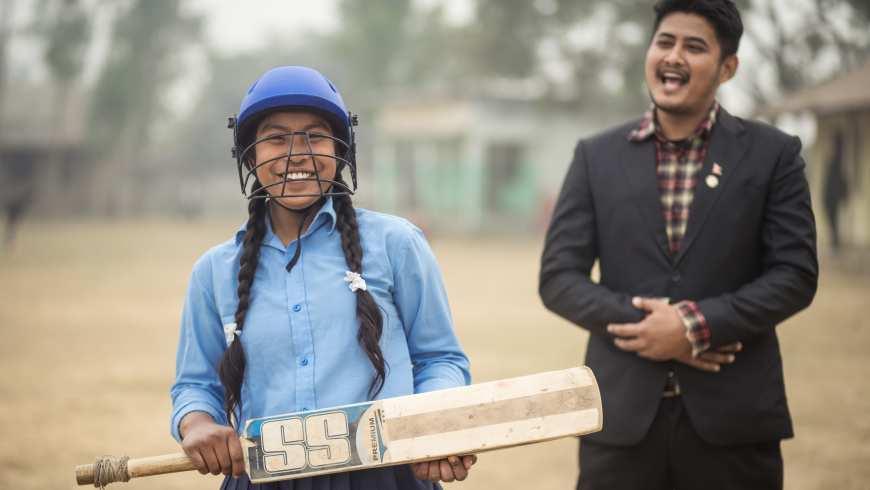
But not everything was easy. Kabita wasn’t sure whether she would play or not. She said that she was afraid to talk to her father about the match because she was confident that he would not allow her to play. She asked if I could come to her home and ask for permission for her. “Today I am here and I can ask permission from your father, but what about tomorrow—who will ask for you then?” I asked. “You should ask for yourself Kabita, if you can’t fight for your dream with your own family, how are you going to fight with society?”
Kabita was silent. She didn’t utter a single word. Eventually, I told her I would come to her house the next afternoon, but instead she came up to me the next morning and said, “I will play! I asked my father and he said okay.” She was courageous enough to ask her father and proved to herself that she was strong enough to fight her own battles.
Finally, the day of the inter-school match was upon us. To me it felt like a battle against all of the prejudices that the girls have always faced. I was overwhelmed when I saw that some community leaders had come to watch the match and were even wishing our girls a good game. As the girls were headed towards the pitch with their bats, it was as if they were going off to war. With every bat and run, they were trying to reach higher and higher to grow confidence and break the gender norms that had held them back.
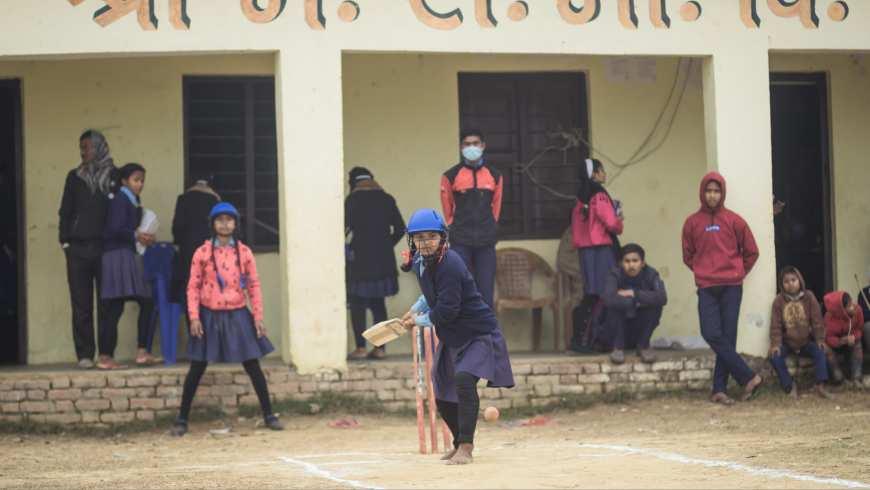
Unfortunately, our team was only able to score 36 runs for a target of 37 and did not win the match. I wasn’t upset about the loss, but I worried that my girls would also lose the confidence and empowerment they’d gained. The next day we reflected on the match. The girls talked about the technicalities and points they had missed and what they would change if they could go back in time. But they also noted that it was the first time that they had participated in inter-school sports — and that while they had heard people making fun of them for losing on the way home, it didn’t matter to them.
It was an overwhelming moment for me. I was so happy to hear this and see that the girls, while unhappy to have lost, were not demotivated. I felt like I had won a great battle and that while my soldiers may be injured, they weren’t dead yet, and had in fact already won their fight against the forces who wanted them to stay shy and quiet. Kabita asked if we could set-up another match.
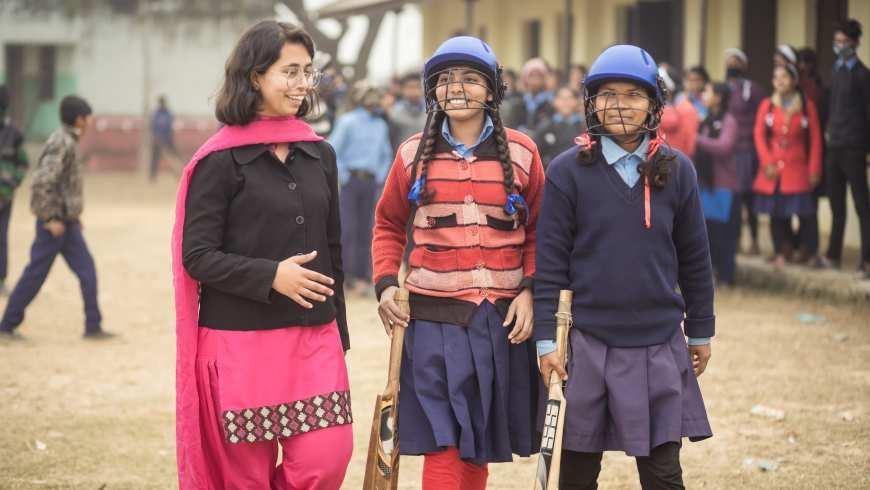
Ultimately, I believe that cricket has played a significant role in building up the confidence of the girls and the boys’ awareness of the challenges girls face. These girls have now gained a certain kind of freedom, freedom like a kite that flies without rope and never falls again. I am proud of our success in raising my girls higher and also increasing the awareness of our boys who now understand the strength that girls can have. The boys are now more likely not to stop their friends, mothers, and sisters from chasing their own freedom beyond the household. They are all growing and taking themselves to the next level and I am so excited for the utopian Nichuta this young generation will create as leaders in the future.
Learn more about Teach For Nepal.


